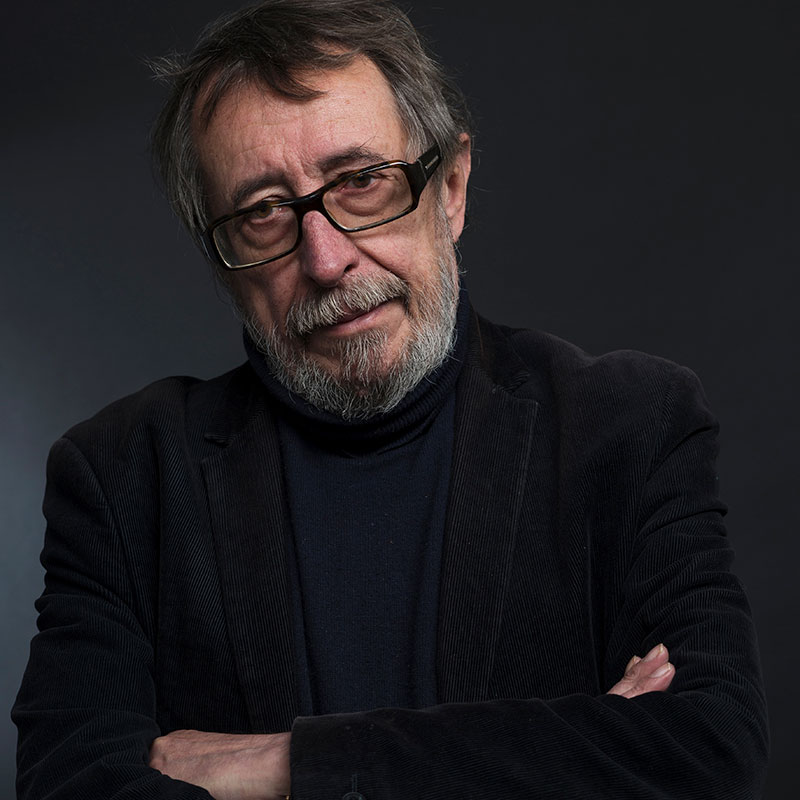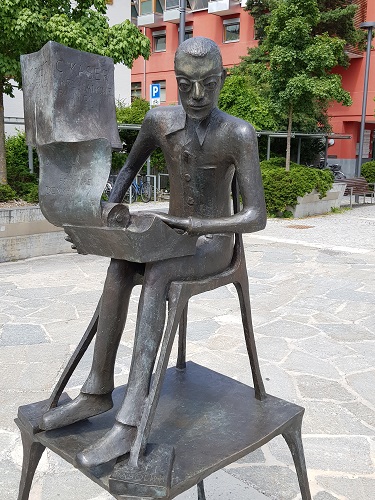De Franse schrijver Patrick Rambaud werd geboren op 21 april 1946 in Parijs. Zie ook alle tags voor Patrick Rambaud op dit blog.
Uit: The Retreat (Vertaald door Will Hobson)
“Captain d’Herbigny felt ridiculous. Swathed in a pale cloak that floated on his shoulders, one could make out a dragoon of the Guard by the helmet enturbanned in navy calfskin, with a black horsetail on its brass crest, but astride a miniature horse he had bought in Lithuania, this strap¬ping fellow had to dress his stirrups too short to stop his boots dragging along the ground – except that then his knees stuck up. “What in Heaven’s name do I look like?” he grumbled. “What sort of a sight must I be?”
The captain missed his mare and his right hand. The hand had been hit by a Bashkir horseman’s poisoned arrow during a skirmish: the surgeon had amputated it, stopped the bleeding with birch cotton because there was a shortage of lint, and dressed the wound with paper from the archives for lack of bandages.
As for his mare, she had bloated after eating rain-soaked green rye; the poor thing had started trembling and soon she was hardly able to stand upright; when she stumbled into a gully, d”Herbigny had resigned himself to destroying her with a bullet behind the ear; it had brought him to tears.
His batman Paulin limped behind him, sighing, dressed in a black coat covered with leather patches and a crumpled hat, and with a cloth bag slung over his shoulder filled with grain he’d gathered along the way; he was leading by a string a donkey with a portmanteau strapped to its back.
These two fine fellows were not alone in railing against their ill fortune. Lined with a double row of huge trees similar to willows, the new Smolensk road they were trudging along ran through flat, sandy country. It was so broad that ten barouches could drive down it abreast, but on that grey, cold September Monday, as the mist lifted it revealed an unmoving crush of vehicles following the Guard and Davout’s army. There were goods wagons in their thousands, a mass of conveyances for transporting the baggage, ambulance carts, masons’, cobblers’, and tailors’ caravans; they carried handmills and forges and tools; on their long wooden handles, scythe blades poked out of one dray. The most exhausted, victims of fever, let themselves be carried, sitting on the ammunition wagons drawn by scrawny horses; long-haired dogs chased in and out, trying to bite each other. Soldiers of all arms of the army escorted this throng. They were marching to Moscow. They had been marching for three months.
Ah yes, the captain remembered, they’d been a mighty fine sight in June when they’d crossed the Niemen to violate Russian territory. The procession of troops across the pontoon bridges had lasted for three days. Just imagine: cannon by the hundred, over five hundred thousand fresh, alert fighting men, French a good third of them, with the grey-coated infantry rubbing shoulders with Illyrians, Croats, Spanish volunteers and Prince Eug”ne’s Italians.”

De Zuidtiroolse dichter norbert c. kaser werd geboren op 19 april 1947 in Brixen. Zie ook alle tags voor norbert c. kaser op dit blog.
klooster (I)
uit de klankgaten
van de ursulinen
klinkt het voor de
veertigurige
aanbidding
een vrouw
die in de lippen
snel bladert
een betere film
voor oude vrouwen met doek
enorme zonde buiten
in de carnavalsstegen
wierook
harmonium
stinkgas
sissen rond kerkbanken
in dubbele rij
zweven de kloosterzusters
door het schip
ingeslikte hoest
een vrouw
die in de lippen
snelle rozenkrans
bladert
het pensioen daalt
koffie stijgt
het bedplassende neefje
de geliefde
rot weg als onkruid
de haarspeld steekt
& die daar die daar
is een slang
voor mij
licht geven aan de missie
& de heidenen
& geld
bij de laatste bel
fladdert
kortademig
de dienstdoende
kapucijner naar binnen
om het lichaam van de HEER
te onthullen
& met zachte woorden
de ziel te vullen
amen
Vertaald door Frans Roumen

Standbeeld van norbert c. kaser op de Rathausplatz in Bruneck.
Zie voor nog meer schrijvers van de 21e april ook mijn blog van 21 april 2020 en eveneens mijn blog van 21 april 2019 deel 2 en eveneens deel 3.
